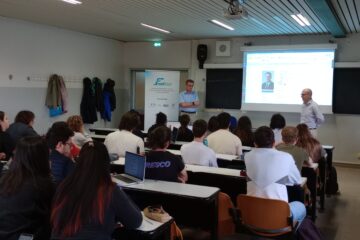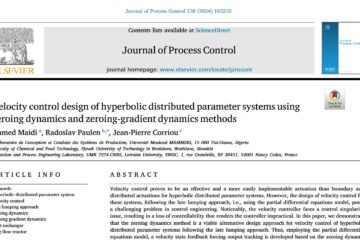Riccardo Bacci di Capaci (RBdC) and Marco Vaccari (MV), both Assistant Professors at the Department of Civil and Industrial Engineering of the University of Pisa, Italy, visited the Institute of Information Engineering, Automation and Mathematics, FCHPT STU in Bratislava from 7 to 11 October 2024. For RBdC, this was his third visit, while for MV, it was his second within the span of one year. This one-week visit was organized under the framework of the FrontSeat project. While MV’s focus was mainly on lecturing, both had the opportunity to increase their research experience further and share rich educational insights.
During the stay, in various informal meetings, they discussed scientific projects with several researchers and PhD students from STUBA. These discussions explored exciting ideas to maintain solid cooperation in areas such as system identification, process modeling, model predictive control (MPC), and numerical integration.
Key activities during the visit included:
- On Monday, RBdC led the seminar Thermal Stress Control of Steam Turbines via Efficient NMPC Strategies for the series of Research Seminars on Smart Cybernetics. He presented the result of a project collaboration between the University of Pisa (UNIPI) group (Prof. Pannocchia, MV, and MS. Garrucciu) and the Industrial partner Baker Hughes, which led to effective nonlinear model predictive controllers for thermal stress control in steam turbines, with various application in MATLAB and Python. Later, RBdC and MV discussed potential future research directions and collaboration opportunities on this topic with Prof. Radoslav Paulen.
- On Wednesday and Thursday, MV delivered a series of lectures as part of the course “Modelling in Process Industry”, organized by the Institute of Information Engineering, Automation, and Mathematics within the FCHPT. The lectures, part of the Winter semester for first-year Master’s students, covered topics such as the modeling of co-current and counter-current heat exchangers and how design affects the modeling of industrial heat exchangers. The lectures were recorded and are available on YouTube. MV also conducted MATLAB-based seminars related to the lecture topics. This exchange enriched MV’s teaching experience, he hopes the students enjoyed the little “Italian parenthesis” in their course. Both MV and Prof. Paulen encouraged students to consider visiting abroad, i.e., they are more than welcome in Pisa for their Master’s thesis period, for example, through the Erasmus program, which can benefit both the students and the universities in strengthening academic fruitful collaboration.

- On Thursday, RBdC and MV discussed with Prof. Paulen and Ing. Rastislav Faber his Ph.D. program – hybrid modeling and real-time optimization under uncertainty. They planned future collaboration, joint papers, and visit exchanges, focusing on multi-fidelity models and the outcomes of Rastislav Faber’s research stay at UNIPI last spring. This activity will be the subject of a conference paper submitted for the upcoming DYCOPS2025.
- RBdC and MV also discussed his activity for the identification of a cascade control architecture within a polymerization unit in the petrochemical refinery of Slovnaft, here in Bratislava, with Dr. Mehmet Arici. They presented the open-source package SIPPY as a powerful tool for fulfilling the task and suggested relevant literature from the UNIPI group on the control of distillation columns.
- On Friday, MV, for the first time, led the seminar Modeling, Simulation and Environmental Analysis of Plastic Waste Pyrolysis: Are We There Yet? for the series of Research Seminars on Smart Cybernetics. He presented recent findings on modeling the pyrolysis process of plastic solid waste (PSW) in collaboration with the Italian Research Centre partner Consorzio Polo Tecnologico Magona, which led to efficient analysis of the profitability of the plant through the application of the recent renewable energy directive (REDIII). The discussion focused on modeling outcomes, possible uncertainty introduced by different processed PSW, and the introduction of possible common future research in the field of surrogate models to integrate and optimize in one place the “high-fidelity” simulation with the detailed environmental life cycle assessment (LCA).

Apart from the very fruitful scientific side, both RBdC and MV did enjoy the experience a lot: visiting Bratislava, enjoying the nice weather and the tasty food, chatting about folk dances in front of beers, and finally playing volleyball (UNIPI side unfortunately lost!).
This project has received funding from the European Union’s Horizon under grant no. 101079342 (Fostering Opportunities Towards Slovak Excellence in Advanced Control for Smart Industries).
Text/Photo: Marco Vaccari and Riccardo Bacci di Capaci





0 Comments